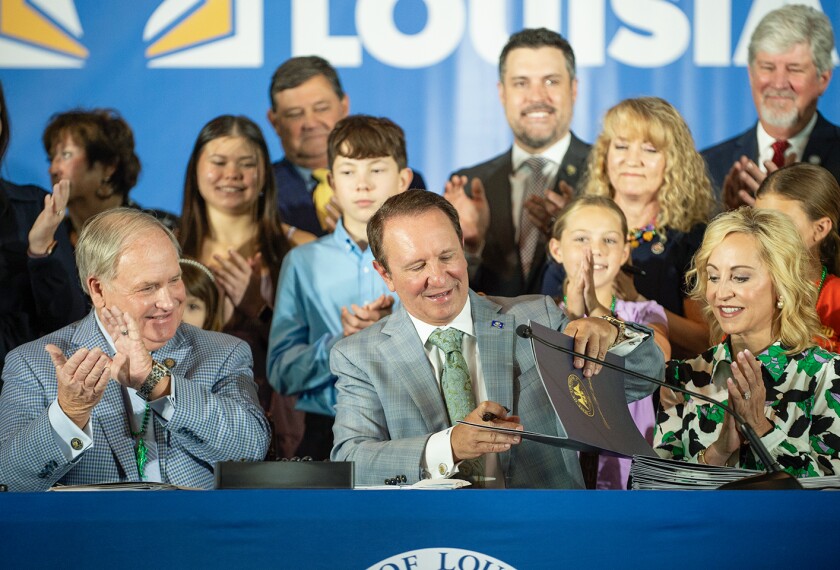Stephen J. Williams says he merely wanted to give his 5th graders an accurate picture of the nation’s heritage by enriching his lessons with documents containing references to God, the Bible, and Jesus Christ.
But matters didn’t look quite so clear-cut to the principal of the public elementary school where he teaches in Cupertino, Calif. After getting parent complaints that Mr. Williams talked too much in class about his Christian faith, last spring she started screening the teacher’s lesson plans and classroom handouts in advance.
Now Mr. Williams’ situation has become a causecélèbre. Charging the San Francisco Bay-area district with trampling on his rights because he is an “orthodox Christian,” the 38-year-old teacher filed a federal lawsuit that has attracted national publicity.
Conservative Christian groups have denounced the 16,000-student district as bent on banishing God from public education. Meanwhile, advocates of strict church-state separation have applauded Cupertino school leaders, saying the district is just standing up for the U.S. Constitution.
“The district is simply attempting to cleanse all references to the Christian religion from our nation’s history, and they are singling out Mr. Williams for discriminatory treatment,” said Gary McCaleb, the senior counsel for the Alliance Defense Fund, a Scottsdale, Ariz.-based legal organization that is backing the teacher’s case. “Their actions are unacceptable under both California and federal law.”
But Donya Khalili, a spokeswoman for the Washington-based Americans United for Separation of Church and State, said the district was right to block what she described as Mr. Williams’ attempts at “indoctrination.”
“The right to teach your children about religion belongs to parents, not to your 5th grade teacher,” she said.
Documents at Issue
A handout with three short excerpts from the Declaration of Independence—one referring to God, another to “their Creator,” and a third to “Divine Providence”—was among a variety of Colonial-era documents that school officials objected to, according to Mr. Williams’ lawsuit.
Among the other materials deemed unsuitable for distribution by the teacher were a National Prayer Day proclamation by President Bush, George Washington’s prayer journal, and a sheet titled “What Great Leaders Have Said About the Bible.” That handout quotes nine presidents praising the Bible, followed by a scriptural passage quoting Jesus.
Mr. Williams’ lawsuit says that he is being singled out for censorship of his classroom materials because of his religion. Only about 5 percent of his handouts “contain references to God and Christianity,” the suit says, and in past years he distributed those materials without interference.
Terry L. Thompson, a lawyer representing Mr. Williams, said the district was guilty of “an overreaction to any mention of God or Christianity in the schools.”
“It’s really a separation of school and common sense,” he said.
For their part, district officials have declined to discuss the case, other than to deny that they violated the teacher’s rights. But they have accused him and his supporters of fostering the false impression that the district had banned the Declaration of Independence, thus causing the district to be showered with thousands of e-mail complaints and unfavorable media coverage.
The Cupertino Unified School District has at no point instituted such a ban, said district spokesman Jeremy Nishihara, noting that the state-approved social studies textbook used in Mr. Williams’ class at Stevens Creek School reprints the Declaration of Independence in full.
‘Close to Proselytizing’
Filed Nov. 22 in U.S. District Court in Oakland, Calif., Mr. Williams’ suit says the Stevens Creek principal voiced concern at the start of the 2003-04 school year that the teacher would try to evangelize in class. The lawsuit says the teacher responded that “because of his religious belief regarding submission to authority, he does not attempt to proselytize his students during instructional time.”
But Cupertino parent Michael Zimmer, whose daughter was in Mr. Williams’ class last year, said the teacher devoted an inordinate amount of class time to religion, “not only in history class, but also in math and science and English.”
“I think it’s very close to proselytizing,” said Mr. Zimmer, who complained to the district about Mr. Williams. “I don’t think that he was actively attempting to convert people, but he was trying very hard to get a message that he thought was important across.”




